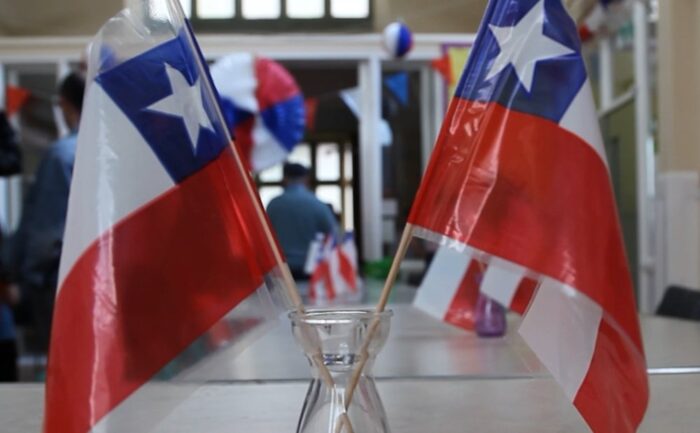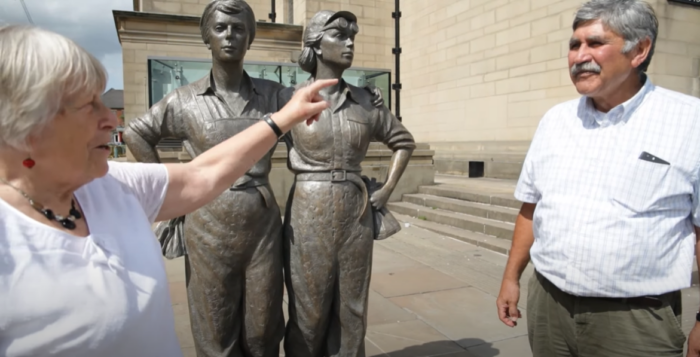Chileans of the North is an exceptional film – a documentary that transcends its genre and becomes a story telling, brilliant for its clarity, compass of many issues and the tender respect shown for its subjects so that rather than being interviewed, they are telling their own story.
Director Chris Paul wanted to tell the story of the Chilean refugees who came to Sheffield and Rotherham in the 1970s; why they came and what had happened in Chile; the people who organised to receive and support them; the Sheffield Trades Council and trade unions who helped to find them jobs; their experiences and feelings; some of the downsides, such as the frequent targeted or casual racism they encountered; their mounting sense of dislocation; their hopes of returning to Chile and the difficulties they experienced when they tried to do so; the strength of their own community and culture and the music, food and festivities they shared with their hosts; their children, born in Britain or growing up here, and their feelings about Chile, their families and their own identity.
No less important was the impact the Chilean community had on Sheffield. This is described in the film with eminent clarity by Helen Jackson, a Labour movement activist at the time, who went on to be MP for Sheffield Hillsborough from 1992 to 2005. ‘It was the real contact with people writing to you from prison in Chile that switched people on. This wasn’t just a mechanical piece of solidarity. These were real people who were active in a labour movement there. It was that bond that made the difference.’

‘I arrived here in a very dark place. It was full of smoke. You couldn’t see a thing,’ describes one of the Chileans. ‘I thought I would stay for two weeks – we were free to go where we wanted… I didn’t realise that there was a group of people in solidarity with Chile. It took me a while to realise. That was an amazing thing [for them] to do.’
The coup and its aftermath
The refugees describe their lives in Chile before the Pinochet coup and their devastation on that day: ‘A very sad feeling because we knew that everything would change, immediately.’ Some were in prisons, and at least one of them was held in Villa Grimaldi, the most notorious of the junta’s torture centres.
Carlos’ case was taken up by the Catholic Church’s Vicaría de la Solidaridad. He was offered a visa by the UK government (by then a Labour government with a pro-active refugee policy). Sergio and Miriam received letters from prisoner adoption groups in Norway and then in England. Bernabé, on arrival in London, was told that the Labour party in Sheffield could provide two places, and he went to live with the Jacksons.
As Pedro recounts, ‘Helen was just helping the Chileans, bringing things in her VW van, pillows, etc. She was a fantastic and very active person. I don’t know how she managed. She was a teacher, but at the same time a full-time supporter.’
Sheffield Trades Council tried to provide opportunities to work, to live, and to learn English. They would find out what the prisoner did, what trade or skill they had and then make the link with the appropriate trade union. Peter Heathfield of NUM Derbyshire said they could find work for a Chilean copper miner. Pedro was found work at Firth Brown [now Forgemasters]. They told him to come at 6:00 am the next morning to punch his card and start work in the Heat Treatment Dept.
The strength of community
Both for the Chileans themselves and for their hosts, the strength and vitality of their community was extremely important. As Helen Jackson says, ‘They were so well-organised, and politicised, we did lots of other social things together. The Chileans being there made much more sense of May Day. The Chileans were always there, because they were wanting to celebrate, in the City Hall.’ They brought with them their flags, fiestas, football, exhibitions, arpilleras (political tapestries), dancing, music and food.

The impetus to return grew after 1989, when Pinochet lost a referendum and the government of Patricio Aylwin took over. But as one refugee says, ‘There was a sadness that Pinochet wasn’t defeated, he did a deal. As you know now, we’re still trying to get rid of Pinochet’s constitution. It wasn’t a revolution.’ Maria adds, ‘We felt sadness too about how long the military regime lasted, how many lives were lost, how many lives affected. I never grew up with aunties and uncles. I felt really sad, that I couldn’t go to my Gran’s house for tea…. Family is so important for Chileans, well it is for most people, in most cultures. We never had that.’
Maria’s parents, Sergio and Miriam, add ‘[to return] was hard for us. My parents had died. For us to go back would have meant separating from our children. The oldest already had a family here. The second one was in love with a girl here. Maria was a teenager, so it would have been a second exile for her, having to adapt anew.’
Maria agrees: ‘We had all grown up here and established our lives. It would probably have meant Mum and Dad going by themselves. But they would never leave their kids, and now a grandchild. It was almost a feeling of loss.’
Pinochet arrested
All the Chileans mention the cataclysmic effect of the 1998 arrest of Pinochet in London, after Spanish judges issued an extradition order. María explains: ‘I’m in London and walking down the street and see the front page of the paper ‘Pinochet arrested’.
‘And I got myself down to the London Clinic, where Pinochet was being held and, I’ll never forget this until the day I die… I get off the tube and walk round the corner, and all I can here is “Asesino”. All my hair stood on end. It was like, it’s this bogeyman that you’ve been told about for seventeen years. Pinochet, Pinochet, hating Pinochet. I remember as kids, making up ways about how we’d kill him. He was such a looming figure in our lives. He encapsulated the whole evil, the shadow of the dictatorship. So to have this man [under arrest] in the Clinic! And there were hundreds of Chileans and supporters, just shouting up at the windows.’
Chileans of the North is beautifully filmed and edited. It interweaves the filmed interviews with documentary footage and black and white and colour still photos – of the city of Sheffield, solidarity events, press cuttings, posters and exhibitions, concerts, demonstrations.
Whether it’s climate change, humanity, cruelty, wars, we’ve got to shift that culture so that we are welcoming to people who are suffering in their own countries, for whatever reason.
Helen Jackson
It is apt that the film is being launched at the Migration Matters Festival on 22 June in Sheffield, because it provides powerful evidence of the importance of solidarity, cultural exchange and community effort in any refugee resettlement.
Helen Jackson says, ‘For many of us that were involved, it makes us feel that we have an enormous job of work to do, to not exactly welcome the migration that has expanded so fast in the last few years, but to recognise the suffering from many countries, throughout the world… the migrants can’t just go back. We ought to have that understanding because, whether it’s climate change, humanity, cruelty, wars, we’ve got to shift that culture so that we are welcoming to people who are suffering in their own countries, for whatever reason.’
The film’s concluding image shows three generations of the Chilean community gathered on a grass mound behind a street sign erected by Sheffield Council: Allende Way.
Chileans of the North (77mins). Director Chris Paul.
You can see the trailer here.
The launch event is at the Migration Matters Festival on 22 June in Sheffield along with Grupo Luma who will be performing songs from Chile and Latin America.
There will be a second screening at University of East London on Saturday 23 September at 2pm as part of the Documenting Chile Archive Launch Event and Open Day – Chile 50 Years UK.
Subsequent screenings are planned in Birmingham, London, Canterbury and Edinburgh.
Details of these and how to obtain the film can be found on the Chileans of the North Facebook page.


